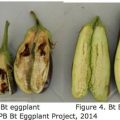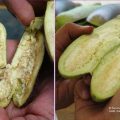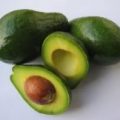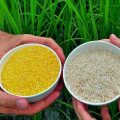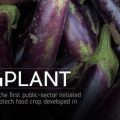The Philippines stands to be a global forerunner in healthful, pesticide-free growing of traditionally intensively-sprayed eggplant having been among world’s Top 10 eggplant producer.
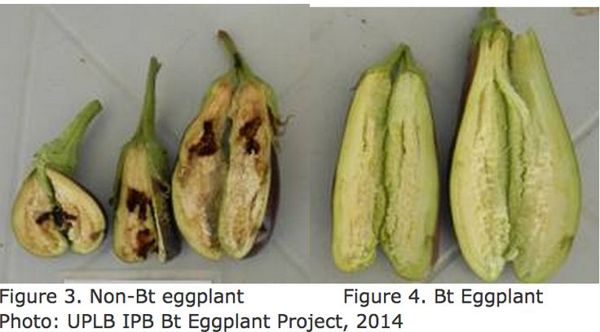
Eggplant is the most important vegetable in the Philippines, taking up 30% of all vegetable production—at around 200,000 metric tons yearly.
But while known for many gourmet recipes—parmigiana, ratatouille, omelette— eggplant is really a vegetable that cannot grow without heavy insecticide spraying.
Filipino farmers spray every other day or 60-80 times in an entire four-month eggplant cropping season.
This they must do just to survive the highly infesting moth “fruit and shoot borer” (FSB).
That puts people’s health at risk.
The first at risk are farmers who have confessed to suffering from dizziness, headaches, skin rashes. Then, definitely, consumers for the intake of a supposedly healthy crop follow.
With the development by Filipino plant breeders of Bt eggplant that has built-in resistance to FSB, Filipino farmers can do away with pesticide spraying by as much as 100%.
Producing the no toxin-laden eggplant is now possible.
Field trial reports released for the first time for public consumption by the Institute of Plant Breeding-University of the Philippines Los Banos (IPB-UPLB) showed Bt eggplant had superior performance in controlling pest FSB.
It involved testing of five open pollinated varieties engineered to produce from the bacterium Bacillus thuringiensis (Bt) a protein called “Cry1Ac.”
Cry1Ac effectively functions as the insecticide that kills the moth FSB when ingested by the pest.
The experiments were done over three eggplant seasons from 2010-2012 in the Philippines’ biggest eggplant producer—Pangasinan.
Pangasinan itself accounts for 18% of Philippines’ eggplant area and more than 30% of the country’s eggplant output.
An ability to stamp out FSB by up to 100% was observed in the Bt eggplant varieties tested on actual fields in barangays Paitan and Sta. Maria in Pangasinan.
These are fields conventionally infested heavily by the FSB moth—more severely during the biggest eggplant season—the dry season.
But IPB scientists did not use any lepidopteran (moth)-specific insecticide during the three trials –both for the Bt eggplant and the non-Bt eggplant.
All throughout three trials, the superior efficacy of Bt eggplant in stopping by virtually 100% infestation of FSB was observed in the three eggplant varieties tested—Dumaguete Long Purple, Mara, and Mamburao.
All three varieties — unsprayed by insecticides– were planted both for Bt eggplant and non-Bt eggplant.
“These results demonstrate that Bt eggplant lines containing Cry1Ac event EE-1 provide outstanding control of EFSB and can dramatically reduce the need for conventional insecticides,” said the IPB scientists led by Desiree M. Hautea.
“Bt eggplant lines demonstrated high levels of control of FSB shoot damage (98.6–100%) and fruit damage (98.1–99.7%) and reduced FSB larval infestation (95.8–99.3%) under the most severe pest pressure during Trial 2.”
In contrast, the non-Bt eggplant suffered 41.58% FSB-damaged shoots, 93.08% damaged fruits, and 16.15 larvae per plot per harvest.
And even when moth’s eggs have been found in the Bt eggplant fruits, the eggs did not survive to form viable fruit-boring insects.
“Under such severe pest pressure, the Bt eggplant lines showed less than 1% EFSB shoot damage, less than 2%, fruit damage and fewer FSB larvae at less than 11 larva per plot per harvest,” said the scientists.
“Commercial production of Bt eggplant has great potential to reduce yield losses to FSB while dramatically reducing the reliance of growers on synthetic insecticides, reducing risks to the environment, to worker’s health, and to the consumer.”
The IPB Filipino breeders’ team also included Lourdes D. Taylo, Anna Pauleen L. Masanga, Maria Luz J. Sison, Josefina O. Narciso, Reynaldo B. Quilloy, and Randy A. Hautea.. It had guest scientists from the Cornell University-New York, Frank A. Shotkoski and Anthony M.Shelton.
Their report was filed with the peer-reviewed journal PLOS (Public Library of Science)
Farmers perennially spraying insecticide on eggplants have suffered from endless health complaints as redness of eyes, skin irritation, muscle pains and headaches due to the spray.
FSB has been most notorious for misshaping and destroying eggplant fruits.
Their most destructive damage are the holes, the tunnels they bore within the eggplant along with the frass (larval excrement) they leave in the fruit—making it dirtily unmarketable.
Insecticide spraying using broad-spectrum — (wide adverse impact) profenofos, triazophos, chlorpyrifos, cypermethrin, and malathion –is the only resort of farmers.
Manual removal of the pest or the damaged fruits and wilted shoots has been found ineffective.
Likewise, use of arthropods and pheromone traps as biological control has been ineffective.
Traditional breeding also failed in controlling FSB.
But the control of pests through Cry1Ac expression into the eggplant through the introduction of the human-safe bacterium Bacillus thuringiensis (Bt) has earlier been proven on cotton and corn.
It is eggplant’s turn to be benefitted by the technology—consequently bringing cleaner, tunnel-free, pesticide-free eggplants for farmers and consumers.
“After more than 40 years, conventional breeding has not produced any commercial variety of eggplant conferring high level of resistance to the FSB. Therefore, efforts became focused on developing Bt eggplant that expresses the same Cry1Ac protein as the cotton.”
The success of the Bt technology in corn and cotton has been widely accepted globally by farmers .
As of 2014 the Bt technology has been planted on 78.8 million hectares in 28 countries “predominantly by resource-poor farmers.”
“Bt crops are another form of host plant resistance, the foundation for integrated pest management (IPM). Insecticide use on them has been substantially reduced,” said the IPB breeders.
“Unfortunately, it has been limited to maize, cotton, and soybean and not fruit and vegetables, except sweet corn. This situation is especially unfortunate since fruit and vegetables, when taken together, receive more insecticides than maize, cotton and rice combined.”
Bangladesh became the first country to grow Bt eggplant. It had 20 fields in 2014 and immediately grew to 108 in 2015.
But Philippines will obviously benefit too from the technology, having been among top 10 eggplant producers in the world as of 2007. (Growth Publishing for Biotechnology Information Center)
For any questions or interview requests, please contact 0929-715-8669, 0917-102-6734 (Growth Publishing for Biotechnology Information Center).
